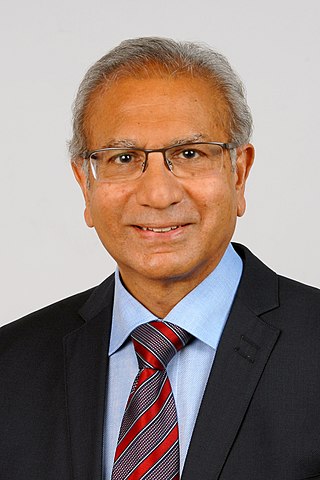Related Research Articles
The Cognition and Brain Sciences Unit is a branch of the UK Medical Research Council, based in Cambridge, England. The CBSU is a centre for cognitive neuroscience, with a mission to improve human health by understanding and enhancing cognition and behaviour in health, disease and disorder. It is one of the largest and most long-lasting contributors to the development of psychological theory and practice.

John Nicolas Walton, Baron Walton of Detchant was a British neuroscientist, academic, and life peer who sat in the House of Lords as a crossbencher.
Sir Peter Julius Lachmann was a British immunologist, specialising in the study of the complement system. He was emeritus Sheila Joan Smith Professor of Immunology at the University of Cambridge, a fellow of Christ's College, Cambridge and honorary fellow of Trinity College, Cambridge and of Imperial College. He was knighted for service to medical science in 2002.
Sir Patrick Dalmahoy Nairne, was a senior British civil servant. His career started in the Admiralty. He eventually became Permanent Secretary of the Department of Health and Social Security and Master of St Catherine's College, Oxford (1981–88). Nairne was a member of the Privy Council of the United Kingdom, appointed in 1982 when he became a member of Lord Franks' official inquiry into the Falklands War, and a governor of the Ditchley Foundation. He was Chancellor of the University of Essex from 1982 to 1997. He was an Honorary Fellow of University College, Oxford. Nairne was the first Chair of the Nuffield Council on Bioethics from 1991 to 1996.
Anthony Seaton qualified in medicine from Cambridge University in 1962, and after training in Liverpool was appointed assistant professor of medicine at the University of West Virginia, USA in 1969. He became consulting chest physician at the University of Wales in 1971, and was named director of the Institute of Occupational Medicine at Edinburgh in 1978. Seaton became the head of the Department of Environmental and Occupational Medicine at the University of Aberdeen in 1988 and on retiring in 2003 became emeritus professor. He continues to write and teach and has active research interests in the causes of asthma and occupational illness.
John Richard Batchelor, known as Richard, was a British immunologist, specialising in transplant immunology.
Michael Stewart Rees Hutt was a British pathologist.
Rodney Harris was a British geneticist.
John Ashton Dodge was a British paediatrician, specialising in cystic fibrosis.
Peter Farmer FRSC, CChem is a British toxicologist.

Robert Lewis Maynard is a British toxicologist.
Lawrence Peter Ormerod was an English chest physician.
Sir Nicholas Andrew Black is a British physician and health services researcher.
James Scott is a British cardiologist.
Jeffrey Kenneth Aronson is a British physician and clinical pharmacologist, currently working in the Centre for Evidence Based Medicine in Oxford.
Ann Prentice, is a British nutritionist.
Domhnall MacAuley is a former physician, a professor of primary health care and a medical journal editor.
Amanda Herbert is a British cytopathologist and histopathologist.

Professor Emeritus Sam H Ahmedzai FRCP, FRCPGlas, FFPMRCoA is a British supportive and palliative care specialist and an Honorary Consultant Physician in Palliative Medicine.
Professor Richard Green (1944–2020) was a British neuropharmacologist.
References
- 1 2 3 4 5 Daphne Christie; Tilli Tansey, eds. (2004). Environmental Toxicology: The legacy of Silent Spring. Wellcome Witnesses to Contemporary Medicine. History of Modern Biomedicine Research Group. ISBN 978-0-85484-091-5. OL 11612218M. Wikidata Q29581678.
- ↑ "No. 54794". The London Gazette (Supplement). 14 June 1997. pp. 1–29.